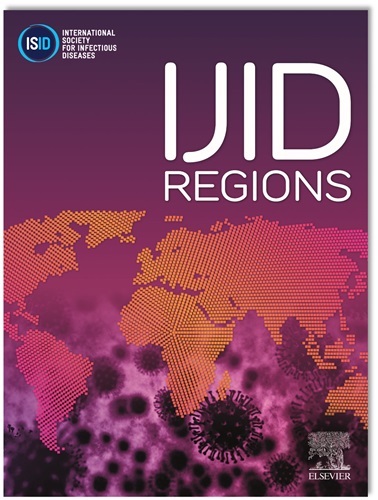当代(2022 - 2023)成人队列中RSV抗体的血清阳性率
IF 4.3
2区 医学
Q1 INFECTIOUS DISEASES
引用次数: 0
摘要
目的:呼吸道合胞病毒(RSV)感染可能导致老年人(≥65岁)的严重疾病和死亡。本研究旨在评估来自美国队列的成人抗RSV IgG抗体的血清阳性率,并比较近期有RSV疫苗接种或感染史的个体的抗体水平。方法:从Mayo Clinic Biobank的剩余血清库(2022 - 2023)中随机抽取475名受试者(年龄27 - 99岁)。采用酶联免疫吸附试验(ELISA)检测样品抗rsv IgG。其他队列包括有记录的RSV感染(n = 40)或最近接种RSV疫苗(n = 71)的个体。结果:在血清阳性率队列中,83.8%的人检测出RSV- a全病毒抗原RSV IgG阳性。男性抗体滴度明显高于女性(p < 0.001), rsv季节后抗体滴度升高(p = 0.02)。与一般队列相比,最近诊断的个体(97.5%)和接种过疫苗的个体(95.8%)的rsv血清阳性率更高。结论:本研究表明,RSV- a IgG在成人血清中有较高的阳性率,存在性别和季节差异,并证实了RSV感染后免疫力下降。最近的感染或疫苗接种可显著提高抗体水平,从而加强了继续监测RSV免疫的重要性。本文章由计算机程序翻译,如有差异,请以英文原文为准。
Seroprevalence of RSV antibodies in a contemporary (2022-2023) cohort of adults
Objectives
Respiratory syncytial virus (RSV) infection may cause serious illness and mortality in older adults (≥65 years). This study aimed to assess the seroprevalence of anti-RSV IgG antibodies in adults from a United States cohort and compare antibody levels among individuals with a history of recent RSV vaccination or infection.
Methods
A total of 475 subjects (ages 27-99) were randomly selected from the Mayo Clinic Biobank’s residual sera repository (2022-2023). Samples were tested for anti-RSV IgG using an enzyme-linked immunosorbent assay (ELISA). Additional cohorts included individuals with documented RSV infection (n = 40) or recent RSV vaccination (n = 71).
Results
Among the seroprevalence cohort, 83.8% tested RSV IgG positive against RSV-A whole virus antigen. Males had significantly higher antibody titers than females (P < 0.001), and antibody titers increased post-RSV season (p = 0.02). Compared to the general cohort, RSV-seropositivity rates were higher in recently diagnosed (97.5%) and vaccinated (95.8%) individuals.
Conclusions
This study demonstrates a high seroprevalence of RSV-A IgG in adults, with variations across sex and seasonality, and corroborates waning immunity following RSV infection. Recent infection or vaccination significantly boosts antibody levels, reinforcing the importance of continued surveillance of RSV immunity.
求助全文
通过发布文献求助,成功后即可免费获取论文全文。
去求助
来源期刊
CiteScore
18.90
自引率
2.40%
发文量
1020
审稿时长
30 days
期刊介绍:
International Journal of Infectious Diseases (IJID)
Publisher: International Society for Infectious Diseases
Publication Frequency: Monthly
Type: Peer-reviewed, Open Access
Scope:
Publishes original clinical and laboratory-based research.
Reports clinical trials, reviews, and some case reports.
Focuses on epidemiology, clinical diagnosis, treatment, and control of infectious diseases.
Emphasizes diseases common in under-resourced countries.

 求助内容:
求助内容: 应助结果提醒方式:
应助结果提醒方式:


